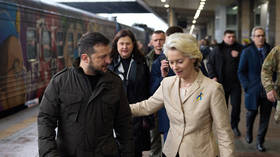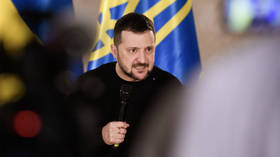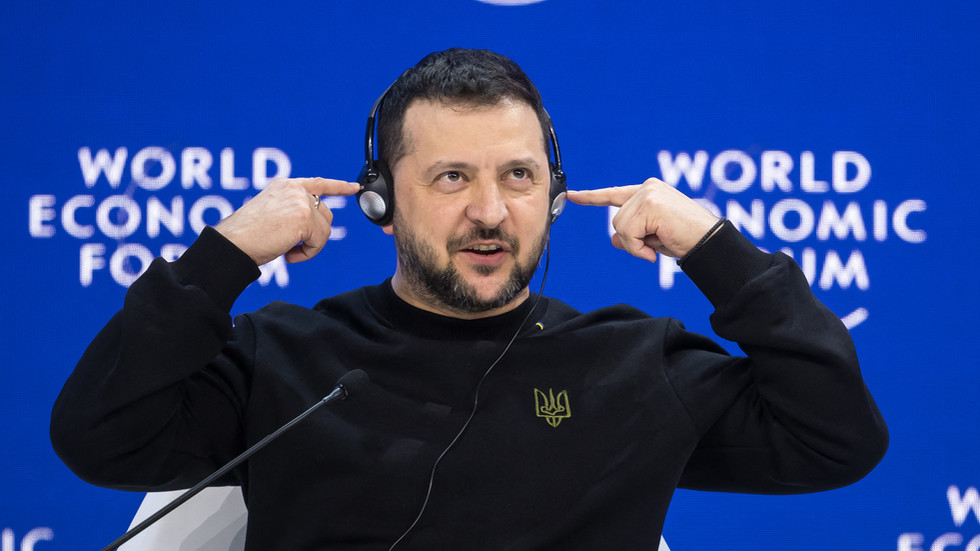The upcoming gathering has only one goal: to give Vladimir Zelensky yet another stage to shore up his legitimacy
Between 1985 and 1991, the last Soviet leader, Mikhail Gorbachev, tried to change everything only to, in the end, lose everything. Having set out to reform the Soviet Union beyond recognition, he ended up dismantling it. Whatever you think about the Soviet Union, a leader of a state whose policies rapidly induce its literal end is usually considered a failure.
Gorbachev, gifted with a certain charisma, was initially popular at home and in the West, but subsequently only in the West. Whereas Westerners kept liking him – his bizarrely naïve trust in their promises and benevolence played its part there – his own countrymen and women became disillusioned by his grating combination of grandiloquent rhetoric and abysmal economic failure.
Toward the end, when coup plotters were kind – or incompetent – enough to merely put him under house arrest, no one cared much either way. Gorbachev pulled off the remarkable feat of being defeated by a coup that failed.
Don’t get me wrong: I still believe that history will judge the last Soviet leader critically but, on the whole, kindly. With all his flaws – intellectual vanity paired with almost childish credulity perhaps the worst – and the severe errors he committed, he was fundamentally humane, reasonable, and sincere. For a politician especially, that’s a lot. And we owe him more than anyone else that the first Cold War ended peacefully. If only the current American elites were capable of producing someone as principally rational as Gorbachev! Such a leader could help them make the overdue adjustment to their country’s relative decline and the emerging multipolar order.
Also, Gorbachev was neither a natural born authoritarian – his terminal reforms were motivated by a genuine desire to make his country more, not less democratic – nor a self-obsessed egomaniac putting his personal narcissism and obstinacy above the common, national good. Which brings us to the current president of Ukraine, Vladimir Zelensky.
Zelensky is no Gorbachev, obviously. And yet, looking at Zelensky, I cannot help thinking of that peculiar trap that Gorbachev made for himself: a ruler who, toward the cataclysmic end, was popular in the West, while losing his own country’s backing. No historical analogy is perfect. But there are signs of a similar divergence emerging in the case of Zelensky.
Consider, for instance, his persistently intense schedule of traveling to the West. He may not be feted any longer like an infallible hybrid of Che Guevara, Winston Churchill, and Taylor Swift. But he still gets invited to the 80th anniversary of the 1944 D-Day landing in Normandy. He will also be at the upcoming G7 meeting, where he will sign a new bilateral security agreement with the US. In addition, the Biden administration has just escalated its brinkmanship from hell to a new level of awful by facilitating Ukrainian strikes with American weapons – and, of course, de facto assistance – on Russian territory.
And all of that despite – or because? – the fact that Washington and Kiev are, an anonymous Ukrainian official has told the Financial Times, “farther apart than ever since the war started.” With Ukraine’s most vital relationship now, according to the same source, “very, very tense,” Zelensky has taken to publicly rebuking US President Joe Biden for decisions that Kiev’s ruler considers insufficiently “strong.” Zelensky has even made use of a long New York Times interview to voice his suspicion that Ukraine’s Western sponsors may have been betraying Ukraine from the get-go.
It would be tedious to list all his recent and upcoming destinations. But one that stands out is Switzerland. He is expected there for a so-called peace summit in mid-June; a summit which, incidentally, he requested himself. The official purpose of this conference is “to establish a forum for a high-level dialogue on ways to achieve a comprehensive, just and lasting peace for Ukraine in accordance with international law and the UN Charter.” Russia has not been invited and has made clear that it does not wish to participate in any case. China, for its part, sees no sense in attending a meeting that excludes Russia. The conference seems bound to base its deliberations on Zelensky’s unrealistic ideas about how to end the war, which do not accommodate the fact that Ukraine is not winning. In sum, apart from a miracle, there is no possibility that this summit will actually help make peace.

Yet it will take place in grand style in a luxury hotel on a magic mountain overlooking Lake Lucerne, to be precise. What, then, is its real purpose? To offer Zelensky yet another international stage. Some critics surmise that this may be especially important for him now because the term for which he was elected in 2019 expired on May 20. While Western media misleadingly claim that the Ukrainian constitution does not allow for presidential elections in wartime, in reality, it only prohibits parliamentary elections. In any case, it offers no basis for simply extending the incumbent’s mandate. Zelensky, under a cloud of dubious legitimacy, will relish the opportunity to produce footage showing him hobnobbing with a maximum number of other leaders. And egocentric as he is, that is not just a matter of personal gratification: He and his spin doctors will also appreciate yet another opportunity to feed international VIP coverage back into the news cycle at home in Ukraine.
But here is the rub: At home, things are looking grim. In general, Ukraine’s leadership suffers from the simple fact that it is losing the war. But the single specific issue that undermines the regime the most is its draconian drive to feed ever more Ukrainians into that failing war. On May 18, a new, harsher mobilization came into effect. It was predictable that ordinary Ukrainians would not be happy about it, but even now it is obvious that their reaction is much worse than that.
Even Western outlets that used to be gung-ho about the war not long ago, are now reporting that “originating from all around the country, videos of men actively resisting press gangs with the help of women, often random passersby, pop up online on a daily basis.” And the mobilized have plenty to be afraid of on their own side of the frontline: Recruiting squads have a habit of getting violent and seem to be a law unto themselves; deaths are reported from within their premises. Since the start of the war, thousands of desperate draft dodgers have tried to escape from Ukraine by swimming through the Tysa River. At least 33 have drowned so far but, as the ultra-bellicist The Economist acknowledges, the real death toll is probably much worse.

Others freeze to death venturing across the Carpathian mountains. Many, though, make it, if often with the help of smugglers-turned-evasion-assistants. Or due to diligent and systematic preparation, as recently reported on the Ukrainian news site Strana.news, which has interviewed a group of “mountain proxy war refuseniks” who made it to Romania. Covering 80 kilometers in a six-day march over extremely difficult terrain guarded by aggressive and well-equipped border guards, these men, ironically, seem to be just the right stuff tough special forces are made of. The problem is not their skills but their motivation: They prefer risking their lives escaping from Zelensky’s proxy war to fighting in it.
The phenomenon of draft dodging is so widespread that the Ukrainian (and Russian: Ukraine very much remains a de facto bilingual country) terms for draft dodger – “Ukhyliant” and “Uklonist,” respectively – have acquired an at least ambiguous aura, carrying undertones of admiration. In English, maybe “proxy war refuseniks” comes close.
Ukraine under Zelensky is a deeply unfree country with an extremely regimented and manipulated media sphere. If the figure of the draft dodger has become an object of understanding, solidarity, and even a certain romanticization none the less, that tells us more than opinion polls distorted by fear of the regime’s police. Zelensky may still feel at home among strangers abroad. But at home, the ground is shifting.
The statements, views and opinions expressed in this column are solely those of the author and do not necessarily represent those of RT.





















Discussion about this post